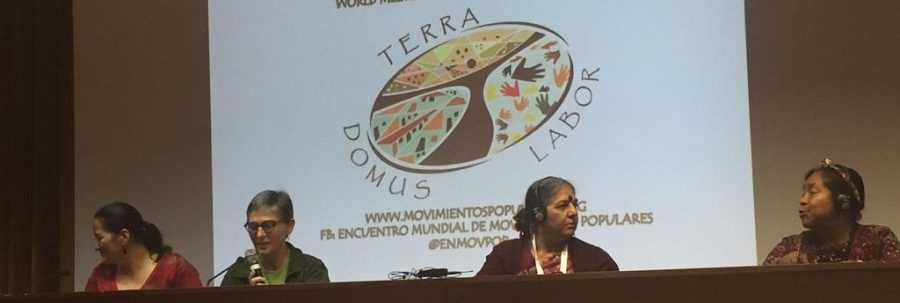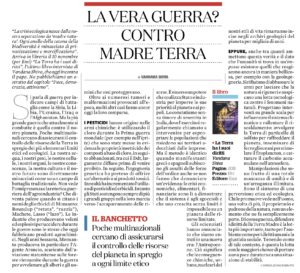
Navdanya is participating in the Third World Meeting of Popular Movements, which is being held in Rome from 2 to 5 November 2016. Dr Vandana Shiva intevened in the panel debate about “Territory and Nature”.
Delegates of Popular Movements from all over the world began the discussions for an action plan that is going to be presented to Pope Francis
Delegades of Popular Movements from all over the world began the discussions for an action plan that is going to be presented to Pope Francis. […] During the interventions the organizing committee remarked the principal subjects of the debate; Land, Housing and Work, including panels about Peoples and Democracy; Territory and Nature; and the situation of refugees. All these realities and worries are going to be analyzed, discussed and synthetized in an action plan that is going to be handed to Pope Francis November 5th. Read more: http://movimientospopulares.org/delegades-of-popular-movements-from-all-over-the-world-began-the-discussions-for-an-action-plan-that-is-going-to-be-presented-to-pope-francis/
The debate about “Territory and Nature” insist on taking care of “Common Home”
In the beginning of the second day of the third World Meeting of Popular Movements there was a tribute to remember every person who has given their life for fighting for their rights. There was a special tribute to the activis Berta Cáceres, murdered because of her commitment with the environment in Honduras; she also participated in the first Meeting. After this manifestations started the discussions about “Territory and Nature. This panel was integrated by Dr. Vandana Shiva, from Navdanya Trust (India); Rosaline Tuyuc, from the Coordinadora Nacional de Viudas (Guatemala); Mónica Crespo from the Federación de Cartoneros y Recicladores (Argentina) y Te Ao Pritchard from the Pacific Panthers Network (Nueva Zelanda). Nohra Padilla, de la Asociación de Recicladores de Bogotá (Colombia) y Ana de Luco de Sure We Can (EEUU) was the coordinator of the debate. Read more: http://movimientospopulares.org/the-debate-about-territory-and-nature-insist-on-taking-care-of-common-home/
Dr Vandana Shiva’s article on « Il Fatto Quotidiano« : « The real war? It’s the one against Mother Earth » – 3 November 2016
On November 5th the Navdanya International team, together with representatives of groups later converged at Pope Francis audience after participating in the #StopCETA day event. Papa Francisco: “Actúen, sigan abriendo camino y luchando. Les da fuerza, nos da fuerza” La última jornada de trabajo del Encuentro se ha desarrollado en el Vaticano. Esta mañana, los delegados y las delegadas de los movimientos populares participaron en una Eucaristía en la Basílica de San Pedro, presidida por el Cardenal Turkson, y que han contado con las ofrendas realizadas por los movimientos populares, que mostraban sus esfuerzos y sus diversas realidades. Contínua leyendo en: http://seedfreedom.info/es/papa-francisco-actuen-sigan-abriendo-camino-y-luchando-les-da-fuerza-nos-da-fuerza/ El discurso completo de Papa Francisco a los Movimientos Populares – Roma 2016 Discorso di Papa Francesco ai partecipanti al 3° Incontro Mondiale dei Movimenti Popolari Transformative Action proposals assumed by Popular Movements around the World in dialogue with Pope Francis Propuestas de Acción Transformadora que asumimos los Movimientos Populares del Mundo en dialogo con el Papa Francisco – Italiano –
Videos
Dr Vandana Shiva’s speech at the debate about “Territory and Nature” –
–

